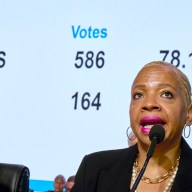MONTREAL – Jean-Max Bellerive, Haiti’s prime minister, is said to have the trust of the international community even though he’s not shy about criticizing his country’s foreign benefactors.
Bellerive, who was named prime minister last fall after his predecessor was sacked, has complained about the co-ordination of aid efforts in the past and the lack of Haitian input.
But he’s been given high marks for staying to build his impoverished country while most wealthy, educated Haitians leave for greener pastures.
Pierre Beaudet, a University of Ottawa professor who is an expert in the foreign aid issue, said Bellerive, 51, is not alone in his criticisms of aid efforts.
“He’s been outspoken about this but I don’t think he’s perceived otherwise than as a serious young man with strong opinions,” Beaudet said.
“He doesn’t appear to be perceived as some sort of strident radical.”
If anything, Bellerive is firmly pro-Haiti – although pragmatically so.
“He knows that Haiti depends to a large extent on the foreign support so there’s no question of riding high horses,” Beaudet added.
“On the other hand, I think he strongly believes it’s the Haitian authorities (that need to be) in the driver’s seat and not the other way around.”
Bellerive has steadfastly insisted that Haitians must lead the reconstruction of their country after their worst earthquake in 200 years.
A longtime technocrat who played a key role in courting foreign investors as minister of planning and external co-operation in the previous cabinet, Bellerive is the No. 2 man in Haiti, after President Rene Preval.
Preval is the head of state and is elected by popular vote. The prime minister is appointed by the president to be the head of the government and must be approved by the legislature.
They both exercise executive power although the president has more.
The son of a doctor who worked with the World Health Organization, Bellerive travelled extensively before returning to Haiti in 1986. The father of two daughters was born in 1958.
He speaks four languages fluently – English, French, Spanish and Creole – and has worked in 10 different Haitian governments, including the military junta and under exiled president Jean-Bertrand Aristide.
An economist, he holds degrees in political science and international relations.
He told the Miami Herald in an interview last November he has survived so long because he sticks to the tasks at hand.
“I want to believe it’s because I kept some ethics, that I’ve stayed in a certain frame of mind, I’ve accepted positions for which I was competent,” he told the Herald.
“And the position was in sync with the morals I believe we should have in politics.”
In fact, he quit as head of the 2000 elections in Haiti’s largest constituency, which includes the capital, before the vote because he said he wasn’t comfortable with how things were going.
Bellerive, who has been appointed to his positions and never run for high office, has been described as a key player by people in Haiti.
“He’s one of the few that has stayed there,” Beaudet said. “The problem with the Haitian elites is that they leave, except for those who are in fact in the political sphere.”
Beaudet said he believes Bellerive has gained respect by choosing to stay.
“He’s committed to the building of the state. Politicians, they come and go. The state remains.”
















